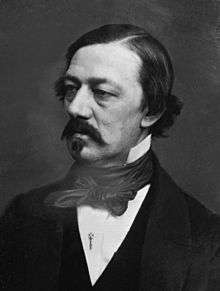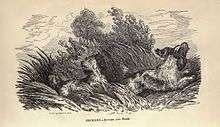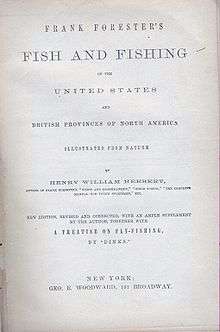Henry William Herbert


Henry William Herbert (April 3, 1807 – May 17, 1858), pen name Frank Forester, was an English novelist, poet, historian, illustrator, journalist and writer on sport.[1] Starr writes that "as a classical scholar he had few equals in the United States . . . his knowledge of English history and literature was extensive; he was a pen-and-ink artist of marked ability; as a sportsman he was unsurpassed; his pupils idolized him."[2]
Biography
The eldest son of the Hon. and Rev. William Herbert, Dean of Manchester (himself the son of Henry Herbert, 1st Earl of Carnarvon), Herbert was born in London.[3]
He was educated at Eton College and at Caius College, Cambridge, where he graduated BA in 1830.[4] Having lost his property through a dishonest agent, he emigrated to the United States in 1831 and for the following eight years taught Latin and Greek at a private school in New York City. In 1833 he started the American Monthly Magazine, which he edited, in conjunction with A. D. Patterson, till 1835 when he withdrew as a result of disagreements with his associate, Charles Fenno Hoffman. His vanity and arrogance due to his ancestry, his father being the son of the Earl of Carnarvon and his mother, the Hon. Letitia Emily Dorothea Allen, a daughter of Viscount Allen, did not win him many friends. Edgar Allan Poe felt that he was "not unapt to fall into pompous grandiloquence" and sometimes was "woefully turgid", while others saw his novels as "prolix, lacking in imagination and humor."
Herbert was a man of varied accomplishments, translating many of the novels of Eugène Sue and Alexandre Dumas, père into English. He is listed as a contributor to the first edition of The New American Cyclopedia by way of writing articles on Archery, Armour, Austerlitz, Balaklava, St. Bartholomew Massacre, Carthage, Charles I & II of England, Charles XII of Sweden etc.[5]
In 1839 he married Sarah Barker, of Bangor, Maine. They had one son, sent to school in England, and who remained there. Sarah died in 1848 and ten years later he married Adela Budlong, who divorced him after only three months.
He was staying at the Stevens Hotel in Manhattan, New York City and he invited Philip Hone Anthon over, saying that he was very lonely, and begged him to spend as much time as possible with him. Herbert took his own life on 17 May 1858 at 2:00 am.[6]
Publications
In 1834 he published his first novel, The Brothers: a Tale of the Fronde, which was followed by a number of others that achieved popularity including:
- The Village Inn; or the Adventures of Bellechassaigne
- The Lord Of The Manor; or, Rose Castleton's Temptation: An Old English Story
- Guarica, the Charib Bride: A Legend of Hispaniola
- The Deerstalkers; or, Circumstantial Evidence: A Tale of the South-Western Counties
- The Fair Puritan. An historical romance of the Days of Witchcraft
- The Warwick Woodlands; or Things as They Were There
- The Roman Traitor; or the Days of Cicero, Cato and Cataline [sic], A True Tale of The Republic
- Marmaduke Wyvil; or The Maid's Revenge
He also wrote a series of historical studies, including:
- The Cavaliers of England (1852)
- The Knights of England, France and Scotland (1852)
- The Chevaliers of France (1853)
- The Captains of the Old World; as Compared with the Great Modern Strategists (1851).
- Oliver Cromwell; or, England's Great Protector
- Memoirs Of Henry The Eighth Of England With The Fortunes And Characters Of His Six Wives

He contributed to one of the early sporting magazines in the United States, the Spirit of the Times,[7] and was well known for his works on sport, published under the pseudonym of Frank Forester. These include:
- The Field Sports of the United States and British Provinces (1849)
- Frank Forester and his Friends (1849)
- The Fish and Fishing of the United States (1850)
- The Young Sportsman's Complete Manual (1852)
- The Horse and Horsemanship in the United States and British Provinces of North America (1858)
- The Dog
Citations
- ↑ "The Vault at Pfaff's - Biographies - Search". Retrieved 29 September 2014.
- ↑ "HENRY WILLIAM HERBERT". Retrieved 29 September 2014.
- ↑ THE INTERNATIONAL MAGAZINE Of Literature, Art, and Science
- ↑ "Herbert, Henry William (HRBT825HW)". A Cambridge Alumni Database. University of Cambridge.
- ↑ Henry William Herbert (Frank Forester). Retrieved 29 September 2014.
- ↑ "Suicide Of 'Frank Forrester'. Sketch of Mr. Herbert's Life. Letters of the Deceased to the Coroner and the Press". New York Times. May 18, 1858. Retrieved 2016-07-29.
- ↑ Mott History of American Magazines 1741-1850 p. 480
![]() This article incorporates text from a publication now in the public domain: Chisholm, Hugh, ed. (1911). "Herbert, Henry William". Encyclopædia Britannica (11th ed.). Cambridge University Press.
This article incorporates text from a publication now in the public domain: Chisholm, Hugh, ed. (1911). "Herbert, Henry William". Encyclopædia Britannica (11th ed.). Cambridge University Press.
References
| Wikimedia Commons has media related to Henry William Herbert. |
- Boase, George Clement, "Henry William Herbert," Dictionary of National Biography, 1885-1900, Volume 26.
- Mott, Frank Luther (1938). A History of American Magazines 1741-1850. Cambridge, MA: Harvard University Press. OCLC 1893743.
External links
- Works by Henry William Herbert at Project Gutenberg
- Works by Frank Forester at Project Gutenberg
- Works by or about Henry William Herbert at Internet Archive
- Works by or about Frank Forester at Internet Archive